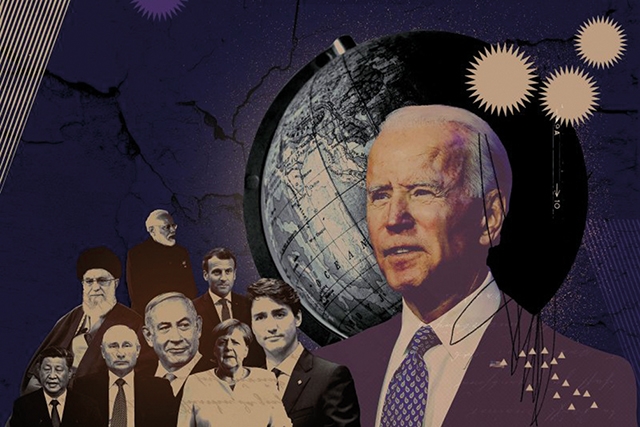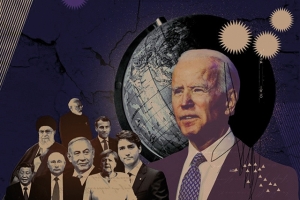Foreign Policy during the Biden Presidency: Probabilities & Realistic Expectations. Part 1
Analysis
Predictably, there has been much recent discussion in Georgian media over the political line of the Biden administration, as well as over the possible developments of US policy, and several potential scenarios have frequently been forecast. These discussions are of course particularly necessary given the overall importance of US foreign policy to the formation of a system of international relations, and of the defense by our main ally of our country’s interests within the framework of the US-Georgia strategic partnership.
We are therefore keenly attuned to any unusual, essential or uncertain changes in US foreign policy, and also have particular expectations. Every change or political U-turn in Washington is directly linked to the present Georgian state and its prospects for development. In addition, these changes send messages to other forces in the region; miscommunicating or misjudging these messages could easily lead to a strengthening of harmful tendencies and the further limitation of Georgian or Western interests.
Scholars and analysts of foreign affairs in Georgia are actively analyzing the Biden administration’s foreign policy. This topic is regularly covered in Georgian print media as well as on television, but it is one that can never be published or discussed too much, as every new word or opinion could lead parties to pursue their analysis, re-evaluate their attitudes towards this or the other issue, or encourage the correction of already “reserved” decisions or approaches. This article was written with this in mind. Certain opinions expressed in it will seem quite debatable to many readers, and it is hoped that it will encourage the further development of this discussion.
Recent Zig-zags
America’s foreign policy for the past few decades has been notorious for the zig-zags of its development. This is no-one’s fault, and does not betray a lack of consistency, but is simply the result of the constant real-world shifts of the international order between different stages of the post-Cold War era. In order to better perceive the problems linked to implementing a “Grand Strategy,” it would suffice to remember that, over the past three decades alone, the world (and US foreign policy alongside it) has greatly evolved since the end of the Cold War. A unipolar world gave way to the stage of the war against global terrorism, and the current stage is that of great geopolitical confrontation. Under these circumstances, developing and following a stable foreign policy naturally became extremely challenging. The absence of a systemic approach was also compounded by the very unusual and unpredictable factor of Donald Trump’s presidency, which was characterized by decisions based upon personal perceptions of global issues and their “transactional” value. This enflamed existing challenges even further, and created fertile ground for new risks.
Contemporary American researchers are trying to draw comparisons between the country’s most recent foreign and diplomatic policies and present or past teachings. This academic study is particularly focused upon the Obama-Trump-Biden triangle, since these presidencies mark the period when new elements emerged in US policy towards “the rest of the world”. Under Biden, this process will most likely acquire new contours, and the global coronavirus pandemic has of course also contributed to changes which have shifted the relatively stagnant old postulates of the international system away from a “dead point” to enable and activate a rearrangement of the global economic agenda (albeit on a still mostly theoretical rather than practical level).
The evolution of the international system and the influence of US foreign policy on this process is naturally an inexhaustible source of discussion, publication, interest and passions. In the end, this process creates a multitude of print or electronic materials in which different authors attempt to prove, academically, the alignment of this or that “strategy” with one of the four main schools of US foreign policy (Jefferson, Jackson, Hamilton, Wilson). But what makes this task even more difficult is the fact that modern progressive, libertarian, realist, liberal-internationalist schools of thoughts have been added to the so-called list of “classical” schools, rendering any discussion of “who’s right and who’s wrong” not only confusing but in some cases even pointless.
Genuine interest has of course driven us towards such disputes, in many of which we have certainly taken part, and we would like to confirm our deepest respect for academic research and recognize the need to support and perfect the application of schools of thought to practical politics. And yet it should be mentioned that the acridity of current challenges requires any such theory to be applied as closely as possible to concrete reality and to be refined in order to permit real decision making, as well the establishment of an organic link between expert observation and specific tasks.
In order to better explain U.S. foreign policy to our readers, these requirements would have encouraged us to simplify this foreign policy by formulating it in the following way: Washington’s desire and readiness to play an active role on the world stage. It is noteworthy, however, that the degree of this activity varies according to different levels, and that the geographical area of declared US involvement is comparably wider or smaller. However, it is significant that, in general, these changes have only been voiced, since the flow of global affairs as well as the special role of the United States in world stability and the avoidance of large-scale cataclysms has been, and is, unprecedented.
Taking these agreements and predictions into consideration, we would like to touch upon the already defined and possible accents of the Biden administration’s foreign policy, particularly as identifying, analyzing and properly understanding them is so important for the health of Georgia’s domestic policy and for the real effectiveness of her foreign policy. In other words, we must arm ourselves with all the knowledge we need to better pursue Georgia’s national interests.
Specificities of the New Administration’s Foreign Policy Course
Personal Character
Against the background of the Obama and Trump administrations, the foreign policy course of the new Biden presidency will naturally be distinguished by several elements. Yet, that said, we believe that we should not expect too radical a change. This is quite a bold assumption, but we will try to explain why we believe this to be true.
For lovers of theoretical parallels, we will begin by noting that the new president does not belong to this or that foreign policy school of thought or camp. His very rich history of international relations points to his inclination for private contacts and links, which must be especially interesting for Georgians. Accordingly, it will presumably be difficult over the next four years to distinguish (as we have been used to doing in the past) a so-called US “Grand Strategy” on the foreign stage with orderly form and content. Obviously, by the end of the Biden presidency, academic circles will eagerly start to define a “Biden Doctrine.” This is only natural: every president of the American super-state leaves his mark. However, we believe that placing such a doctrine into any kind of ideological “ism” will be difficult, and that it will mainly be a mixture of already tried and modified components. The main question is how orderly and effective this doctrine will be, and this only time can show.
Inner Flows
Among America’s foreign policy schools of thought, realism has always been prominent thanks to many distinguished scientists or scholars (Morgenthau, Waltz, Mearsheimer, Walt and others). However, when seeking to define a practical policy, this very interesting and prestigious school (in its different forms) has always fallen under the different influences of international liberalism. Objectively speaking, this prioritization has its historical explanation (the bitter experiences of two world wars) as well as its practical justification and benefits. None of these can be rejected, particularly as the mere attempt to do so would be a great injustice.
It is noteworthy that, already at the beginning of the Obama presidency, the “World Policeman” approach began to be revised, and several theories acquired a conceptual form under Trump. During the “ups and downs” of both periods, we spoke in many publications of a certain renaissance of realism (and as some refer to it: egoism) in foreign policy, and we will not stop here to mention this again. The question now is: will the United States continue to withdraw from participating in global processes, or will it go back to its usual activity under Biden? This is a very important and interesting question for the world, and has deep meaning for Georgia.
A quick answer to this question would be that, in our opinion, neither of the two above-mentioned expectations will completely come to pass, and that the Biden administration’s foreign policy course will mostly be intermediate. Explaining the reasons for this format is difficult, but we will try to do so nevertheless.
Let us begin by considering the degree of inertia of this or that foreign policy course of a country of such scale and role as the US; this also touches upon opposition to radical change by a state machine acting with the same inertia and “dominant” experts acting in an organized manner. As a so-called “Bidenish” counterweight to such opposition, we would consider the formation of the new administration (especially the State Department, National Security Council and other levels of the security system), but our expectations in this regard can be no more than moderate when we remember that many key figures of the new administration were already employed under Obama. By the way, an evaluation of the current personnel policy concluded that the election of Biden is a “third term” of Obama’s presidency. This comparison is no doubt an exaggeration, but it should be considered from the point of view of the Black Sea region and Georgia (not forgetting the useless “restarts” and general caution of the Obama era).
It is a fact that pragmatic analysts unhesitatingly believe in the need to “revolutionize” relations between the United States and the Black Sea region and Georgia. They and we (and others) will presumably see over the next two years at the most whether we are right to expect our strategic ally to properly evaluate this issue and begin to act.
Here we should mention the importance of the need for systemic and large-scale co-operation with U.S. and Western analytical and research centers. The assumption that decisions are solely based upon the information circulating through official Western channels is off-the-mark: regarding this or that issue, decisions are very often already made before they reach formal processes, and we Georgians should therefore be more proactive during the initial stages, or else our partners will struggle to achieve the “cumulative efficacy” that we need.
Continued on georgiatoday.ge and in next week’s GT.
By Victor Kipiani, Chairman, Geocase
Illustration by Eleanor Shakespeare for TIME












